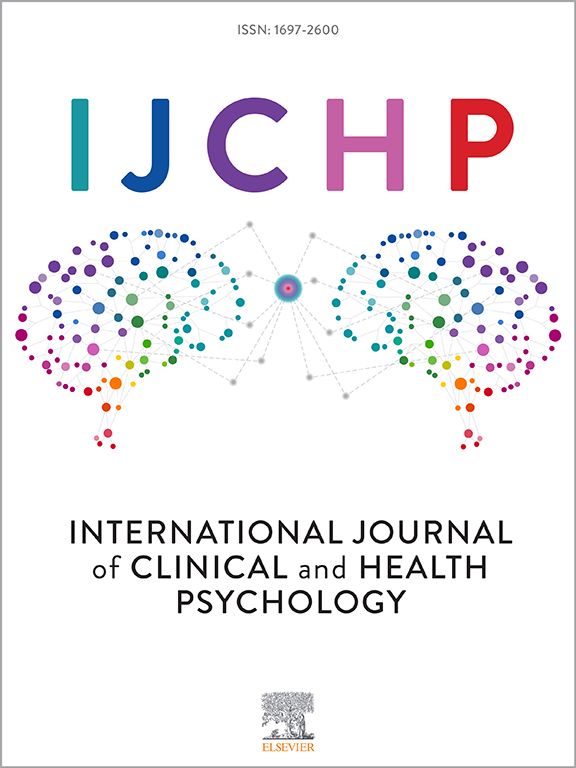在日本和美国,情绪抑制在调节压力和心血管疾病风险之间的联系方面存在差异
IF 4.4
1区 心理学
Q1 PSYCHOLOGY, CLINICAL
International Journal of Clinical and Health Psychology
Pub Date : 2025-01-01
DOI:10.1016/j.ijchp.2025.100555
引用次数: 0
摘要
背景:心血管疾病(CVD)仍然是世界范围内导致死亡的主要原因。先前的研究发现,压力和心血管结果之间的关联是通过情绪调节(ER)和表达抑制(即情绪抑制)来调节的,而情绪抑制在西方(美国)人群中与不良结果(即炎症)有关,而在东方(日本)人群中则没有。现有的生物应激反应和抑制使用的文化差异表明,这些因素可能对CV结果有不同的影响。目的:我们通过研究内质网是否在日本和美国成年人之间调节压力和心血管疾病风险之间的差异来解决文献中的这一空白。方法参与者来自日本和美国的中年研究,具有完整的生物标志物和心理数据(日本:N = 315,男性= 59.22,女性149;美国人:N = 524,法师= 51.98,女性291)。使用感知压力量表对压力进行索引。采用情绪调节问卷对特质抑制和重评进行指数分析。使用体重指数、c反应蛋白、白细胞介素-6、收缩压和高密度脂蛋白胆固醇比的综合评分来评价心血管疾病的风险。结果在调整了年龄、性别、教育程度、吸烟、饮酒和处方药使用等因素后,线性回归显示高抑制组存在显著的文化差异(r = -0.10[-0.19, -0.01])。在美国,无论重新评估或抑制水平(r's >;0.11, p's <;0.07)。相比之下,在高抑制的日本人中,较高的压力与较低的CVD风险相关(r = -0.09[-0.23, 0.05])。在抑制较低的日本人中,较高的应激与较高的炎症相关(r = 0.10[-0.07, 0.28])。结论:与先前的研究一致,这些发现表明适应性内质网调节了压力和心血管疾病风险之间的关联,这种抑制可能不是普遍的“不适应”。“研究结果强调了在评估情绪抑制对健康的影响时考虑文化背景的重要性,这可能有助于解释东西方人群之间心血管疾病结果的差异。”本文章由计算机程序翻译,如有差异,请以英文原文为准。
Emotion suppression differentially moderates the link between stress and cardiovascular disease risk in Japanese and Americans
Background
Cardiovascular disease (CVD) remains a key cause of mortality worldwide. Prior work has found that the association between stress and cardiovascular outcomes is moderated by emotion regulation (ER) and expressive suppression (i.e., emotion inhibition), which is linked with adverse outcomes (i.e., inflammation) in Western (Americans) but not Eastern (Japanese) populations. Existing cultural differences in biological stress responses and suppression use suggest that these factors may have different implications for CV outcomes.
Objective
We address this gap in the literature by examining if ER differentially moderates the relationship between stress and CVD risk between Japanese and American adults.
Method
Participants were from the Midlife in Japan and Midlife in the United States studies and had complete biomarker and psychological data (Japanese: N = 315, Mage = 59.22, 149 females; Americans: N = 524, Mage = 51.98, 291 females). Stress was indexed using the perceived stress scale. Trait suppression and reappraisal were indexed using the Emotion Regulation Questionnaire. CVD risk was indexed using a composite score of body mass index, C-reactive protein, interleukin-6, systolic blood pressure, and high-density lipoprotein cholesterol ratio.
Results
Adjusting for age, sex, education, tobacco, alcohol, and prescription medication use, linear regressions revealed robust cultural differences among those with high suppression (r = -0.10 [-0.19, -0.01]). Higher stress was linked with higher CVD risk in Americans regardless of the level of reappraisal or suppression (r's > 0.11, p's < 0.07). In contrast, among Japanese with high suppression, higher stress was associated with lower CVD risk (r = -0.09 [-0.23, 0.05]). Higher stress was associated with greater inflammation among Japanese with lower suppression (r = 0.10 [-0.07, 0.28]).
Conclusions
Consistent with prior work, these findings suggest that adaptive ER moderates the association between stress and CVD risk, and that suppression may not be universally ‘maladaptive.’ Results emphasize the importance of considering cultural context when assessing the impact of emotion suppression on health, which may help explain differences in CVD outcomes between individuals from Eastern and Western populations.
求助全文
通过发布文献求助,成功后即可免费获取论文全文。
去求助
来源期刊

International Journal of Clinical and Health Psychology
PSYCHOLOGY, CLINICAL-
CiteScore
10.70
自引率
5.70%
发文量
38
审稿时长
33 days
期刊介绍:
The International Journal of Clinical and Health Psychology is dedicated to publishing manuscripts with a strong emphasis on both basic and applied research, encompassing experimental, clinical, and theoretical contributions that advance the fields of Clinical and Health Psychology. With a focus on four core domains—clinical psychology and psychotherapy, psychopathology, health psychology, and clinical neurosciences—the IJCHP seeks to provide a comprehensive platform for scholarly discourse and innovation. The journal accepts Original Articles (empirical studies) and Review Articles. Manuscripts submitted to IJCHP should be original and not previously published or under consideration elsewhere. All signing authors must unanimously agree on the submitted version of the manuscript. By submitting their work, authors agree to transfer their copyrights to the Journal for the duration of the editorial process.
 求助内容:
求助内容: 应助结果提醒方式:
应助结果提醒方式:


